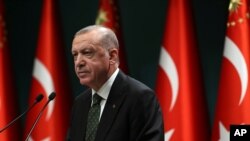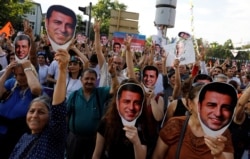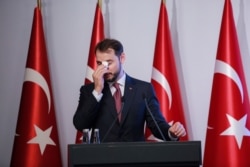Turkish President Recep Tayyip Erdogan is pledging sweeping human rights reforms, a move that analysts say anticipates increased scrutiny by a new U.S. administration. It also comes as opinion polls indicate plummeting support for Erdogan’s party.
Under Erdogan’s rule human rights groups and Turkey’s western partners have condemned what they claim is the rapid deterioration in human rights. Tens of thousands of people have been jailed, including prominent politicians and civic society members in an ongoing crackdown on dissent.
Speaking after Tuesday’s cabinet meeting with ministers, Erdogan said, “In the coming days, the draft of the Human Rights Action Plan will be finalized by working with all of the country’s economic stakeholders.”
Rights groups are calling for action rather than words.
“The messages are fine but we want to see it born out with real evidence of a change and so far that has not been forthcoming,” said Emma Sinclair Webb, Turkey researcher of Human Rights Watch.
Thursday, Human Rights Watch and ARTICLE 19, a London-based rights group, issued a joint statement calling for the release of Selahattin Demirtas, the former leader of Turkey’s second largest opposition party, the pro Kurdish HDP.
Demirtas has been in jail for four years, after being convicted on terrorism charges. In 2018 the European Court of Human Rights overturned his conviction ruling it was “politically motivated.”
“The subsequent refusal of the court to release him, despite the ruling of the European Court of Human Rights, is a shocking reminder of the power of the executive in Turkey to influence court proceedings,” said Sarah Clarke, head of Europe and Central Asia at ARTICLE 19.
The Turkish government defends Demirtas’ incarceration, saying the Kurdish leader faces other charges in relation to a political speech he made that authorities labeled as terrorist propaganda.
Another high profile detainee, philanthropist Osman Kavala, could be close to release. Turkish Justice Minister Abdulhamit Gul last week announced a review of Kavala’s case.
The jailing of Kavala in 2017 on terrorism charges and his subsequent conviction drew widespread national and international condemnation. Last year, the European Court called for his release.
Prominent government newspaper columnists this week called for his liberation in a move in move some observers have interpreted as a sign he could be freed soon.
Biden’s scrutiny
Analysts say the victory of President-elect Joe Biden – an outspoken critic of Turkey’s human rights record – is a factor in Ankara’s calculations.
“Erdogan’s promise of reform and human rights has to do with declining support for AKP but also the expectation that a Biden presidency will be tough on human rights. Let’s see what will come out of it,” tweeted Asli Aydintasbas, a senior fellow of the European Council of Foreign Relations.
Support for Erdogan’s ruling AKP is plummeting according to recent opinion polls that show Turks’ approval of the party is falling below 30% for the first time since its formation in 2001.
Turks cited the country's economic problems, made worse by the COVID-19 pandemic, as their primary concern. The Turkish lira has lost nearly a third of its value this year.
In a dramatic move earlier this month, Turkey’s economic czar and Erdogan’s son-in-law Berat Albayrak resigned.
Erdogan replaced Albayrak and the head of the central bank with appointees seen as popular with international financial markets. Along with human rights reforms, the Turkish president is vowing to introduce legal and economic reforms to restore the country’s reputation with foreign investors.
"A deal with Biden, and pushing forth with democratic and economic reforms, offers the opportunity to draw in more foreign capital and improve business confidence at home,” said analyst Atilla Yesilada of Global Source Partners.
To further boost the country’s economy, Ankara is also looking to the EU to renew a custom union agreement, but European leaders have tied any renewal to improvements in the country’s human rights record.
For now, Ankara is reaping the rewards of its newly found appetite for reform, with the Turkish lira surging in value in the last week.
But some rights advocates question Erdogan’s commitment to make changes.
“We want the high-profile names released, we need to see Osman Kavala out of prison, Turkey needs to see this,” said Sinclair Webb. “Rather than just a gesture, real reform would mean root and branch reviews of law and review of cases of thousands of people detained,” she said.
A complicating factor is Erdogan’s parliamentary coalition partner Devlet Bahceli of the nationalist MHP. While Bahceli has echoed calls for human rights reform, he remains strongly opposed to any easing up on the so-called war on terrorism that primarily targets the country’s Kurdish separatist movement.






